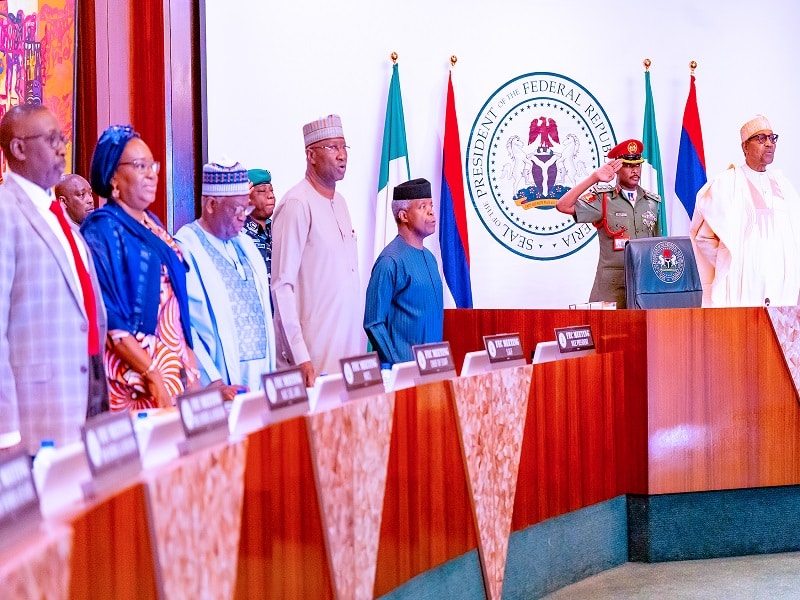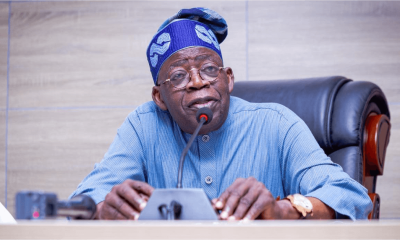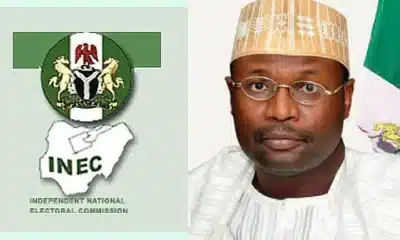Editorial
Buhari Cabinet’s Suspicious Contract Awards

It was another impetuous contract bazaar at this week’s Federal Executive Council (FEC) meeting where instead of hearing about their debate on policy issues or directions on matters that advance the cause of the common Nigerian, all the nation got was the announcement of a flurry of suspicious contract awards and allocation of funds for projects. It indeed raises eyebrows and doubts that such has become the preoccupation of a government that has less than 50 days to quit the scene! It is apparently not about finishing strong since the timelines for the contract delivery spill into the life of the next administration.
At the cabinet meeting of the Federation on Wednesday, contracts amounting to a staggering N48,996,488,925 were awarded under the ministries of Works and Housing; Finance, Budget and National Planning and Transportation. Contract cost revision by way of augmentation for the old Enugu/Onitsha Road was awarded in the sum of N17,050,000,000, which revised the contract to N48,996,488,925. The completion time for this project was then extended to 42 months. The FEC also approved a fresh contract for the maintenance of the pavement of the Third Mainland Bridge in Lagos to gulp ₦6,278,063,585.58 for a period of 24 months.
The Council went ahead to approve a total of N18,544,797,176 for the restructuring of the auditorium of the Nigerian Customs Service’s headquarters, as well as the purchase of 337 operational vehicles. Then, there was the approval of N495 million for the supply of eight colour imaging X-ray scanners, eight body scanner metal detectors and 50 hand-held scanners for railway stations in Abuja, Kaduna and Kano states. This is coming less than a month after the same cabinet has approved $984.7 million for the procurement of maintenance equipment for the Nigeria Railway Corporation (NRC).
The FEC had also approved sundry contracts worth N210 billion for provisions of various infrastructures, including free internet services at 20 of the nation’s airports, 43 higher institutions and 20 markets, across the country. Part of this fund is the N95.98 billion earmarked for various road projects, while N59. 78 billion is approved for the continuation of the ongoing Ogoni clean-up. Like the others before and after it, these are projects that cannot be completed within the 45 days that the Buhari administration has to be in office. With the manner the Council is going, the current government is on its way to awarding more contracts in its crepuscule than was the case in its hay day.
Naija News is therefore constrained to ask: why the rush and the fire-brigade approach to the award of contracts and variations of funds? Why would a government widely perceived to have turned lame-duck be so engrossed with awarding contracts and allocating funds that are not even available but are being borrowed? It is understandable for government officials to want Nigerians to believe that they are working and will continue until the very last day but such posturing should not be at the expense of the public purse. What justification is there in the government’s borrowing of $1.5 billion for futile “repair and rehabilitation” of the state-owned moribund and loss-making refineries? Whose interest is being served here? It is ironic for a government that is bent on removing petrol subsidies due to dwindling revenue to be this brazenly profligate.
The third mainland bridge billed to gulp N6.28bn was shut down for months last year by both the Federal and Lagos governments for repairs. How is it that another round of work will be happening there so soon? With the Lagos government involved in its maintenance, won’t there be a duplication of contract awards? The Minister of Works, Raji Fashola explained that the earlier maintenance work focused on the sub-structure of the bridge, the piles, the underwater piles, the pile caps, and also the replacement of the expansion joint and the bearings. “What we’re dealing with now is different. It is the driving surface and the aesthetics… All the experience of avoiding potholes on the bridge, this award of contract will tackle that.” Be that as it may, the N6.28bn cost component can build a brand-new bridge in other climes depending on the exchange rates.
There is also the approval of ₦1,257,612,549.76 by FEC for the provision and installation of an audio-visual system, conference hall, finishing, ground, provision and installation of acoustic paneling and door for the auditorium at the Nigerian Customs headquarters, and then partitioning and doors. We cannot but ask how this improves the lot of the common man! The projects and contracts that Nigerians hear of after the weekly cabinet meetings ought to have been completed within the life of the current administration. It is unacceptable for them to be envisaged to stretch up to the middle of the next government’s tenure.
Nigerians get the short end of the stick when government plays possum for much of its lifespan only to wake up in the dying minutes to begin disbursing funds for projects. What becomes of accountability and probity in such circumstances? Doesn’t this approach to governance create lush funds for last-minute looting by corrupt officials? Who are the benefitting contractors? Granted that a sitting administration should remain functional until the very last day and that government is a continuum, public perception needs to be considered so that there is no room for suspicion and doubts. That the succeeding administration is of the same party doesn’t mean they should be denied the elbow room to determine their priorities. We hope that the incoming administration will take a second look at these contracts and not be blinded by partisan interest or the proclivity to cover up but act strictly in the best interest of Nigerians.
This is more so as contract figures from recent FEC meetings don’t seem to care that the country is already neck-deep in debt. As of 2022, a World Bank report has it that Nigeria’s debt was at risk of becoming “unsustainable” in the long term as macro-fiscal shocks may disrupt its debt-to-GDP ratio. It lambasted the government’s excessive recourse to the ‘Ways and Means’ advances from the Central Bank of Nigeria as most treacherous to public finances and the economy. The International Monetary Fund (IMF), as admitted by the Minister of Finance, Zainab Ahmed, has pointed out that Nigeria has a revenue crisis. In view of the above concerns, the departing government should have been more circumspect and austere even if as a show of remorse for amassing a national record-breaking debt burden in eight years. It is bad enough that a government that should ordinarily be winding down is now hobbling the next administration with expensive and expansive contracts.
Naija News regrets that the practice of the Council chambers being a contract-awarding parlour continued up to the twilight of the Buhari administration. It was expected that the Public Procurement Council would have been constituted to handle the award of contracts. We, therefore, call on the incoming administration to act in line with the Public Procurement Act, 2007 by routing every contract through an 11-member Public Procurement Council comprising five members from the government and six from professional bodies. The FEC should be spared the distraction of awarding contracts so that cabinet meetings can be devoted to robust debates on issues of national interests from which the President gets winning ideas on how best to steer the ship of state.












